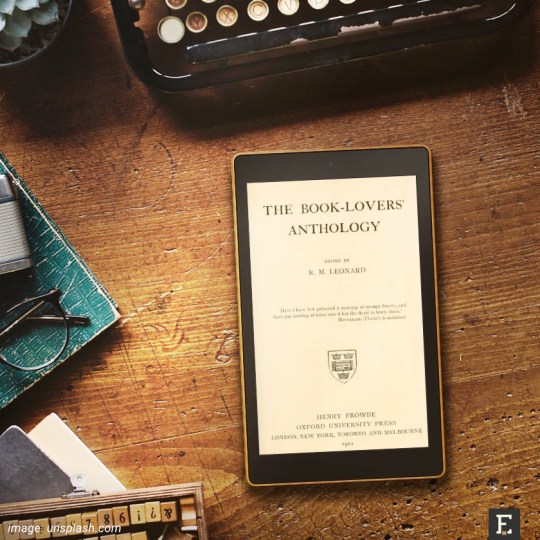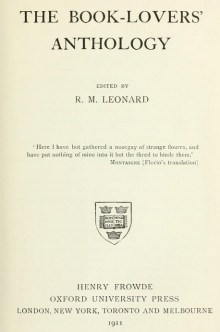
Are you looking for fresh, lesser-known quotes about books and reading? One fantastic book from 1911 includes a lot of them.
The Book-Lovers’ Anthology is an inspiring read about the love of books from the times when reading was still a privilege.
The book was published in 1911 by H. Frowde / Oxford University Press. Edited by Robert Maynard Leonard, it is a carefully curated collection of essays and book excerpts that do just one thing: explain, embrace, and express the love for books, reading, and libraries.
It’s an excellent read for book lovers, no matter whether they are young or old, or whether they lived in the beginning of 20th century or one hundred years later.
R.M. Leonard made a huge effort to collect texts, excerpts, and essays from 250 authors – in times when there was no internet and Wikipedia. Majority of the short pieces date from the 16th to the beginning of the 20th century. Among the authors, you will find:

- William Shakespeare
- Jane Austen
- Charles Dickens
- Thomas Moore
- Jonathan Swift
- Ralph Waldo Emerson
- Miguel de Cervantes
- George Gordon Byron
- William Makepeace Thackeray
- Voltaire
At the end of this post you will find a few texts from the book. The first one describes Charles Dickens’s early reading experiences. The second text, written by James Beresford, defines “bibliosophia.”
In the preface, R.M. Leonard wrote:
There is a wide circle to whom this collection should appeal, in addition to bibliomaniacs or mere collectors of first or rare editions to whom the contents are often anathema, for the love of books is not confined to scholars or great readers. This love is incommunicable: it comes, but happily seldom goes, as the wind which bloweth where it listeth; it is perfectly sincere, and knows nothing of conventions and sham admirations.
I found the book and downloaded it for free from Project Gutenberg. Even earlier, it was added to the Internet Archive. It’s hard to believe such a valuable title and a must-read for book lovers was missed by content curators!
You can download the ebook for free, as the title is available in the public domain for some time. Besides the two sites mentioned above, you will find it on other websites that offer free public domain books. You can choose from several file formats: epub (for iBooks, Nook, Kobo, among others), mobi (Kindle), or pdf.
Find the download links below:
⇢ Project Gutenberg ⇢ Internet Archive
If you want to read the book right away, without downloading it, you can open and read it in your web browser on Project Gutenberg. You can browse the book using the browser’s search feature.
For a “vintage book experience”, visit the Internet Archive. You’ll have a chance to read the scanned pages of the original edition from 1911 – searchable, and customizable.
The book is extremely easy to handle. It consists of short excerpts, each one of the length of a blog post. It’s a great read for those who can’t find enough time for books, who struggle with internet distractions, or suffer from short attention span.
We’ve put together the most interesting passages in a special list of book quotes, where some of the texts are available to share as images.
I’m sure you’ll find many interesting passages in The Book-Lovers’ Anthology. Highlight them, collect them, share them. They deserve it. The love for books is timeless – and worth spreading more than ever before.
[ef-reco id=”99562″ title=”Read also” info=”Top article”]
The Book-Lovers’ Anthology – selected texts
Charles Dickens’ Early Reading
Charles Dickens, David Copperfield
My father had left a small collection of books in a little room upstairs, to which I had access (for it adjoined my own), and which nobody else in our house ever troubled. From that blessed little room, Roderick Random, Peregrine Pickle, Humphrey Clinker, Tom Jones, the Vicar of Wakefield, Don Quixote, Gil Blas, and Robinson Crusoe, came out, a glorious host, to keep me company. They kept alive my fancy, and my hope of something beyond that place and time,—they, and the Arabian Nights, and the Tales of the Genii—and did me no harm; for whatever harm was in some of them was not there for me; I knew nothing of it. It is astonishing to me now, how I found time, in the midst of my porings and blunderings over heavier themes, to read those books as I did. It is curious to me how I could ever have consoled myself under my small troubles (which were great troubles to me), by impersonating my favourite characters in them—as I did—and by putting Mr. and Miss Murdstone into all the bad ones—which I did too. I have been Tom Jones (a child’s Tom Jones, a harmless creature) for a week together. I have sustained my own idea of Roderick Random for a month at a stretch, I verily believe. I had a greedy relish for a few volumes of Voyages and Travels—I forget what, now—that were on those shelves; and for days and days I can remember to have gone about my region of our house, armed with the centrepiece out of an old set of boot-trees—the perfect realization of Captain Somebody, of the Royal British Navy, in danger of being beset by savages, and resolved to sell his life at a great price. The Captain never lost dignity, from having his ears boxed with the Latin grammar. I did; but the Captain was a Captain and a hero, in despite of all the grammars of all the languages in the world, dead or alive.
This was my only and my constant comfort. When I think of it, the picture always rises in my mind, of a summer evening, the boys at play in the churchyard, and I sitting on my bed, reading as if for life. Every barn in the neighbourhood, every stone in the church, and every foot of the churchyard, had some association of its own, in my mind, connected with these books, and stood for some locality made famous in them.
Bibliosophia
James Beresford, Bibliosophia
I will begin, by designating the high and dignified passion in question by its true name—BIBLIOSOPHIA,—which I would define—an appetite for COLLECTING Books—carefully distinguished from, wholly unconnected with, nay, absolutely repugnant to, all idea of READING them.
Observe, then, with merited admiration, the several points of superiority, which distinguish the Collector, when brought into fair and close comparison with the Student.
As First; the said Collector proceeds straight forward to his object, and (with one only exception which will hereafter be shown) under the most rational hopes of accomplishing it. There is but a certain, and limited, number of books to which he and his inquisitive fraternity have agreed to consecrate the epithet ‘curious’; and all of these—with the requisite allowance of cash, cunning, luck, patience, and time—he is within the ‘potentiality’ of drawing, sooner or later, within his clutches:—whereas the Student, granting him the wealth of a brewer, the cunning of a horse-dealer, the luck of a fool, the patience of Jerry Sneak, and the longevity of the Wandering Jew, can never hope even to taste an hundredth part of the volumes which he meditates to devour.
In the next place, the treasures of the Collector, when once he has submitted to the pleasing toil of procuring them, are his own;—his own, I mean, in the single sense in which he is desirous so to call them; for he leaves them in the safe custody of his shelves, until the arrival of that proud moment, when he shall be dared by an envious rival, to prove that the title-page of some forgotten (and thence remembered) volume, is perfect—or properly imperfect; or that it enjoys the reputation of having been printed, long before the Art had approached towards any tolerable degree of improvement; or, that it possesses some one, or more, of those curious advantages, upon which a fitter occasion for expatiating will present itself by and by:—and now, how stands the point of possession, with the Student?—unprosperously indeed!—for besides that, as already observed, he can never possibly possess, in his sense of that expression, more than a wretched modicum of his coveted treasures, he is doomed to a very precarious property even in those which he may have actually hoarded; inasmuch as they are entrusted to the care of that most treacherous of all librarians, Memory,—which, at all times, and of necessity, treats the Student’s collections, as the professed Collector, occasionally, and by choice only, is tempted to treat his,—by casting out a great part of them for want of room…. ‘Let us now be told no more,’ of the superiority of the Student over the Collector.
Why Books Are Read
Samuel Johnson, Adventurer
It is difficult to enumerate the several motives which procure to books the honour of perusal: spite, vanity, and curiosity, hope and fear, love and hatred, every passion which incites to any other action, serves at one time or another to stimulate a reader.
Some are found to take a celebrated volume into their hands, because they hope to distinguish their penetration by finding faults that have escaped the public; others eagerly buy it in the first bloom of reputation, that they may join the chorus of praise, and not lag, as Falstaff terms it, in ‘the rearward of the fashion’.
Some read for style, and some for argument: one has little care about the sentiment, he observes only how it is expressed; another regards not the conclusion, but is diligent to mark how it is inferred; they read for other purposes than the attainment of practical knowledge, and are no more likely to grow wise by an examination of a treatise of moral prudence than an architect to inflame his devotion by considering attentively the proportions of a temple.
Some read that they may embellish their conversation, or shine in dispute; some that they may not be detected in ignorance, or want the reputation of literary accomplishments: but the most general and prevalent reason of study is the impossibility of finding another amusement equally cheap or constant, equally independent of the hour or the weather. He that wants money to follow the chase of pleasure through her yearly circuit, and is left at home when the gay world rolls to Bath or Tunbridge; he whose gout compels him to hear from his chamber the rattle of chariots transporting happier beings to plays and assemblies, will be forced to seek in books a refuge from himself.
Title page via Internet Archive.
• • •
To get more posts like this, please subscribe by RSS. Let’s also connect on Facebook, Twitter, and Pinterest.
Keep exploring. Here are more tips, news, and lists for book lovers:
[ef-archive number=5 tag=”lists”]








Leave a Reply